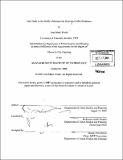Fair Trade in the fields : outcomes for Peruvian coffee products
Author(s)
Walsh, Jean Marie, 1969-
DownloadFull printable version (9.520Mb)
Other Contributors
Massachusetts Institute of Technology. Dept. of Urban Studies and Planning.
Advisor
Judith Tendler.
Terms of use
Metadata
Show full item recordAbstract
Accessing specialty coffee markets is recognized as a way for some small-scale coffee farmers to earn higher prices, counteract unequal distributions of market power, and achieve a better quality of life. Members of CEPICAFE, a Peruvian coffee producer association that has gained access to Fair Trade and organic markets, do receive higher prices than they would by selling to local traders. However, many members consider exporting higher-quality coffee through their association (not Fair Trade) to be the reason they receive better prices than non-members. Furthermore, they often regard non-monetary benefits and collective goods (not necessarily higher prices) as the biggest advantages to membership in an association. This paper seeks to address the following questions: In what ways has CEPICAFE impacted the livelihoods of coffee farmers in Peru? What role have alternative markets played in enabling CEPICAFE to deliver benefits to members? What challenges does CEPICAFE face, and what are some strategies to confront these challenges?
Description
Thesis (M.C.P.)--Massachusetts Institute of Technology, Dept. of Urban Studies and Planning, 2004. Includes bibliographical references (leaves 81-84).
Date issued
2004Department
Massachusetts Institute of Technology. Department of Urban Studies and PlanningPublisher
Massachusetts Institute of Technology
Keywords
Urban Studies and Planning.